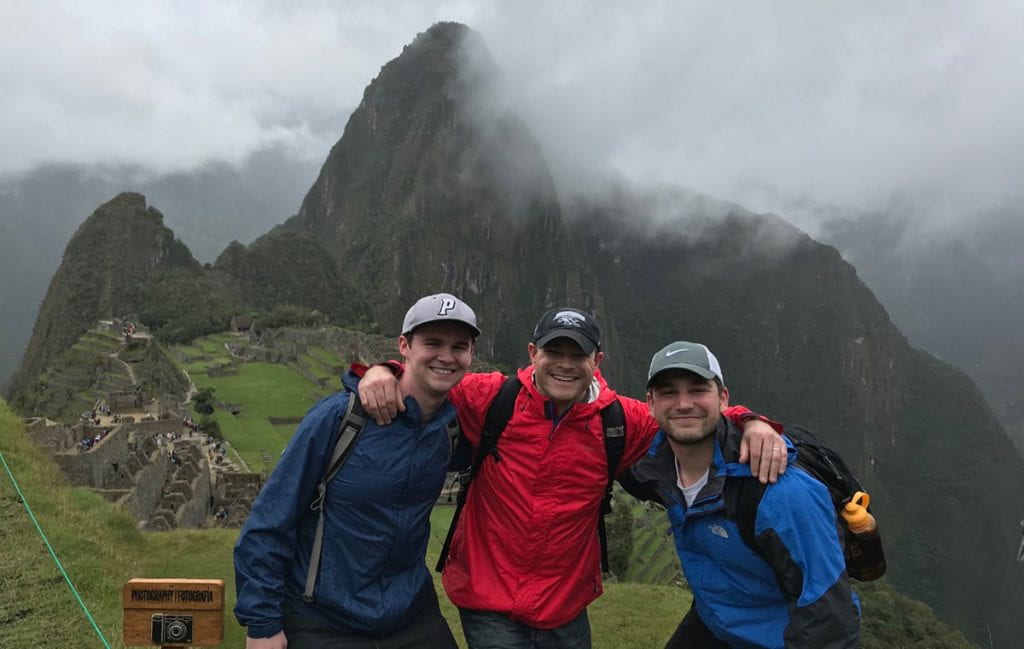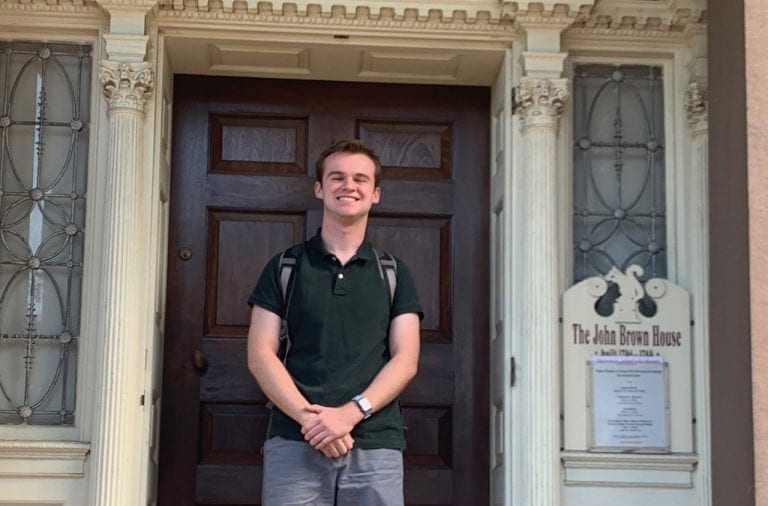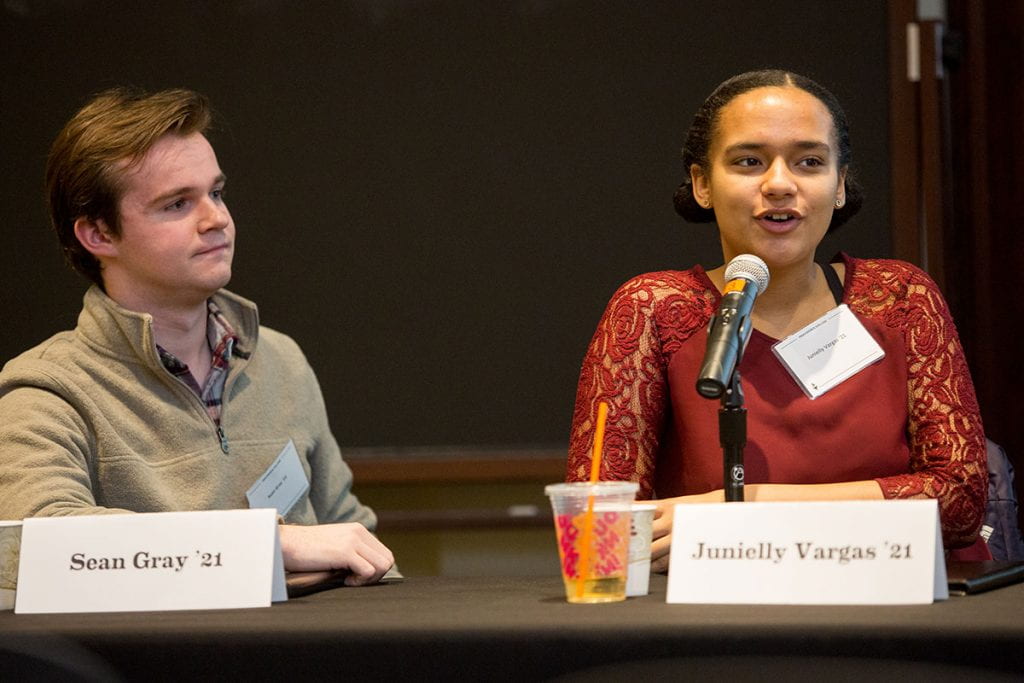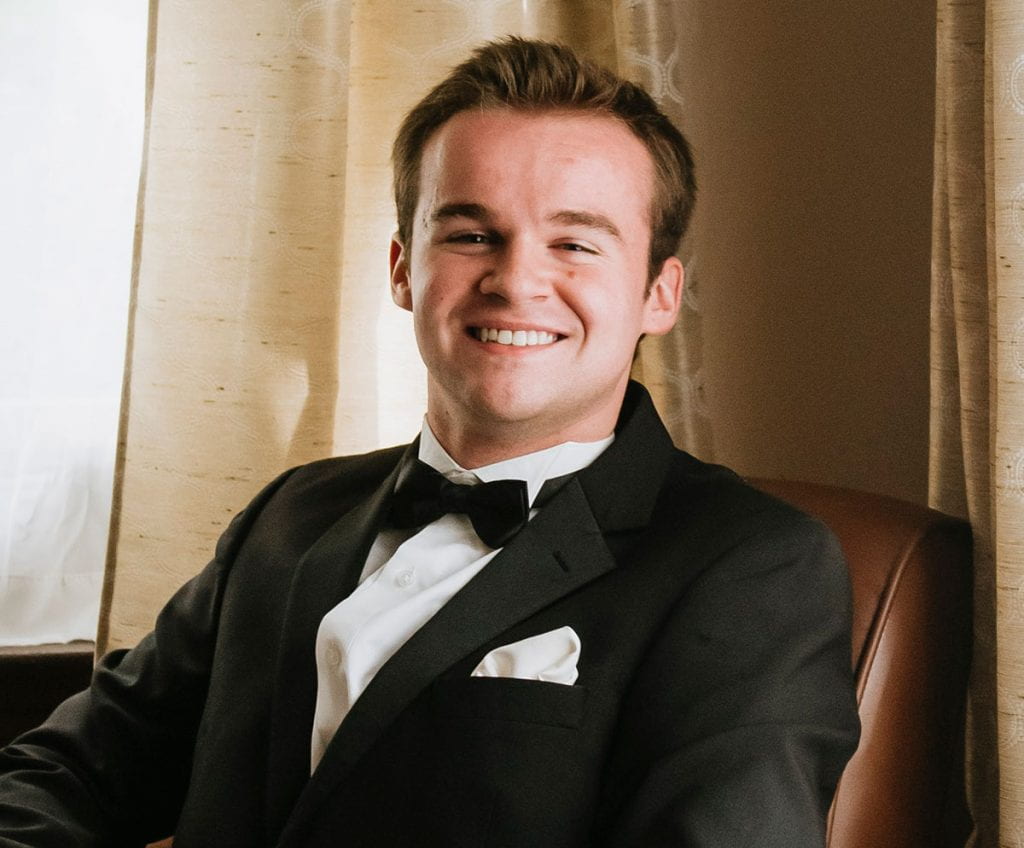Sean Gray ’21: Researching history and making it, too
By Vicki-Ann Downing
Sean Gray ’21 spent the past year researching history and making it as well, as a student representative on the Continuity Task Force, the 150-member group that planned and managed the return to on-campus instruction last fall and whose work continues during the coronavirus pandemic.
Leadership and scholarship have characterized Gray’s time at Providence College. A resident of Lincoln, R.I., he is a history major with minors in Spanish and philosophy. He is vice president of Student Congress, the head writing tutor in the Office of Academic Services, and the recipient of a prestigious fellowship to study in Berlin. After graduation, he plans to attend law school and already is receiving acceptances.
Gray is one of 20 student volunteers on the Continuity Task Force. He serves on the Teaching and Pedagogy Committee, which met all summer to develop recommendations to ensure that faculty would be equipped with the technology and skills needed to teach students who elected to learn virtually in the fall. He served with professors, staff, and administrators.

For students and faculty alike, the transition to online learning in March 2020 was unexpected and abrupt, Gray noted.
“It was definitely difficult for me because I am a hands-on learner,” Gray said. “I like to ask questions in class. But my professors overall did a really good job. They were incredibly flexible, transparent, and supportive.”
He was eager for the chance to learn in person again when classes resumed in late August.
Gray described the task force as “Providence College at its finest — 150 students, faculty, staff, and administrators working together to reopen the college, all on their own time.”
In the fall, a virus outbreak among students living off campus required a shift to remote learning for several weeks, but in-person instruction resumed in mid-October and continued until the Thanksgiving break.
Gray hesitates to deem the semester a success because “you run the risk of becoming complacent. You don’t want to say there is nothing you can improve on.”
“But the fact we reopened at all, to a certain degree, is a success,” Gray said. “The school did a really nice job with the infrastructure they set up — surveillance testing and pods. And they worked hard to get buy-in from everyone. But I think you can only go back and define success after the year is over.”
The pandemic was a busy time for the 71st Student Congress, which began meeting last May. After the Black Lives Matter protests, members “developed a heightened consciousness that a lot more needs to be done at PC,” Gray said. “I think it’s one thing to set up committees to have these conversations, and another to look at your policies and the outcomes of those policies and how they shape people’s lives.”
So, in the fall, Student Congress amended its bylaws to establish the 13-member Committee for Awareness, Education, and Collaboration, to work on proposals designed to make the College a stronger, better, and more accepting institution. The group presented its findings to College President Rev. Kenneth R. Sicard, O.P. ’78 & ’82G and will present to the Board of Trustees’ new diversity subcommittee.
“Father Sicard is already taking some steps based on our recommendations and those of others,” Gray said. “I’m satisfied with the response. I appreciate Father Sicard’s candor and his willingness to listen to us. But we still have a way to go. This work is never finished.”
One duty of Congress is to engage students, a challenge during the pandemic. Gray said leaders especially worked to reach out to first-year students.
“These were students whose high school proms, senior sports, and graduations were canceled, and they’re off to college wearing masks,” Gray said. “It’s hard to make friends. I thought we did a good job at bringing them on board. There’s something lost for all of us. But we’re navigating these virtual spaces and trying to build a sense of community in virtual ways.”
College life during the pandemic requires making the best of a situation. Late in his junior year, Gray was notified that he had been awarded the prestigious Berlin Fellowship by Humanity in Action, an organization that brings college students and recent graduates together to promote civic engagement, human rights, and democratic values.
If not for the pandemic, he would have spent June 2020 at the University of Goethe, participating in seminars and listening to speakers discuss human rights in the context of Germany’s colonial history and the Holocaust. Instead, he experienced the event through Zoom video conferencing.
“It ended up being fantastic,” Gray said. “I was on Zoom every day with 30 young changemakers, academics and activists from across the world. We learned about everything from the strengths and limits of diversity as a tool to how student unions in the 1960s shaped German memory about the Holocaust.”
Now he is developing an action project, a civic initiative in which the community can participate.
“The motto for Humanity in Action in Germany is: ‘We bridge the historical with the present to act for the future,’” Gray said. “I couldn’t think of a better way to describe my interest in history.”
Gray learned about Humanity in Action through Dr. Darra Mulderry, associate director of PC’s Center for Engaged Learning and director of national and international fellowships and scholarships. He applied for the Berlin program because of a course he took with Dr. Jennifer Illuzzi, associate professor of history, called Europe Since 1945. (Because of his interest in American history, he had also applied for Humanity in Action’s John Lewis Fellowship to Atlanta, to study the legacy of Lewis and the American civil rights movement.)

In the spring, Gray also was awarded a $4,000 Veritas Summer Undergraduate Research Grant from the College to support research on his senior thesis. Thanks to the grant, he was able to live in his off-campus apartment during the summer and still have time for the Berlin fellowship and to serve on the Continuity Task Force when he wasn’t doing research.
His thesis, a 70-page paper, is about John Jay, the first chief justice of the U.S. Supreme Court. Gray is exploring why Jay declined an invitation from outgoing President John Adams to return to the court for another term as chief justice in 1800. Jay’s response, that he would never return to “a system so defective,” was surprising, given his mild-mannered nature. Gray is researching what Jay felt was lacking in the system.
Gray has been accepted to present his thesis at the annual Undergaduate Research Workshop at the McNeil Center for Early American Studies at the University of Pennsylvania. The workshop is an opportunity for top undergraduate historians from around the country to discuss ideas, source materials, and research methods with graduate mentors. Gray also will have the honor of presenting his thesis at the 12th annual conference in April.
His thesis advisor is Dr. Steven Carl Smith, associate professor of history and assistant department chair.
“I’ve known Sean for three years now and cannot speak highly enough about him,” Smith said. “Sean is an exceptional student. He’s a gifted writer, a talented researcher, and a sharp mind. He’s also one of the friendliest young men you’ll ever meet — affable and always ready to have a conversation. He has made Providence College a better place by being here for four years, and he’ll make the world a better place when he leaves. He’s destined for success, no matter what path he chooses.”
Gray is head writing tutor — a paid position — in PC’s Writing Center, part of the Office of Academic Services in Phillips Memorial Library. He has worked there for three years and was among those who adjusted last spring when the pandemic moved all tutoring services online.
“I’ve really been impressed by how OAS has moved platforms virtually,” Gray said. “I love to work on the Writing Center whiteboards. If you share your screen on Zoom, you can do white boards, too.”
Gray’s research and writing skills were evident from the start of his time at PC. As a sophomore, he won second prize and $125 in the annual Phillips Memorial Library Undergraduate Craft of Research competition for “The Shortcomings of the Philosopher President: Sun Yat-sen’s Provisional Presidency of 1912,” a paper written for a Modern China course with Dr. D. Colin Jaundrill, associate professor of history.
As a junior, he won first place and $150 in the same library contest for a paper comparing Thomas Paine, the American political writer, and Camilo Henríquez, a Franciscan friar whose political efforts helped form the Republic of Chile. He wrote the paper for a seminar course with Smith — 1760-1840, the Age of Revolutions — that examined whether revolutions in America, France, Haiti, and the Latin American countries lived up to their ideals.
“Henríquez was influenced by Paine in references to quotes and structure. In argument style, they were very similar,” Gray said. “They were both central to their independence movements.”
Gray also received the Rev. Paul van K. Thomson Award, presented to the best student to complete the two-year Honors Development of Western Civilization Program.
In the summer of 2019, Gray interned with the Rhode Island Historical Society. This year, two of his papers were published in Rhode Island Historical Society’s online publication, EnCompass: “Governor Joseph Wanton and the Controversial Commission” and “Aaron Briggs: Willing Participant or Weary Prisoner?”
Both papers are about the aftermath of the burning of the HMS Gaspee, a British ship that was enforcing trade laws unpopular with Rhode Islanders when it ran ashore off the coast in 1772. Wanton, the last governor of the Rhode Island colony before the Revolution, struggled to ease tensions between the British and colonists. He later was accused of being a Tory and ousted for his support of the royalists. Briggs, an enslaved Black teen, tried to use the ship’s destruction as a way to attain his freedom

As any history major knows, a degree in history opens many career paths. After considering both academia and the law, Gray chose law school. During the summer, he took the LSAT-Flex, the shortened, online version of the traditional law exam. He is applying to law schools and already has acceptances at the University of Chicago, Georgetown University, and Boston University, among others.
Among the factors in Gray’s decision was his experience during a Winter Break Shadowing Program offered by PC’s Center for Career Education and Professional Development. Gray shadowed Timothy F. Evans ’83, program manager for the U.S. Department of Justice, during the federal government shutdown.
Gray is a legacy student — his parents, Mark Gray ’78 and Julia Ann Crowley Gray ’81, are PC graduates, as is his brother, Kevin Gray ’12, who majored in health policy and management and philosophy and was a member of Friars Club.
Gray looked at many colleges before deciding that Providence would be the best fit, just as he considered several majors before settling on history.
“It was the best decision I made at PC,” Gray said. “It’s so great. The faculty is wonderful.”
Gray has worked as a research assistant in the Department of History and Classics with Smith, associate professors Dr. Margaret Manchester ’83G and Rev. David Orique, O.P., and assistant professor Dr. Osama Siddiqui.
In the past, he has enjoyed intramural sports, especially flag football —“I’m not particularly good, I’m a better coach than a player, but I have fun and try really hard” — and played on an inner tube water polo team, Will Toner’s Warriors, named after the senior associate director of the Writing Center.
“I love sitting in a back table in the Writing Center with my books and my laptop and getting my work done,” Gray said. “The library is wonderful at providing resources, really helpful and very supportive. It’s a large part of how I’m able to get good research done.”






